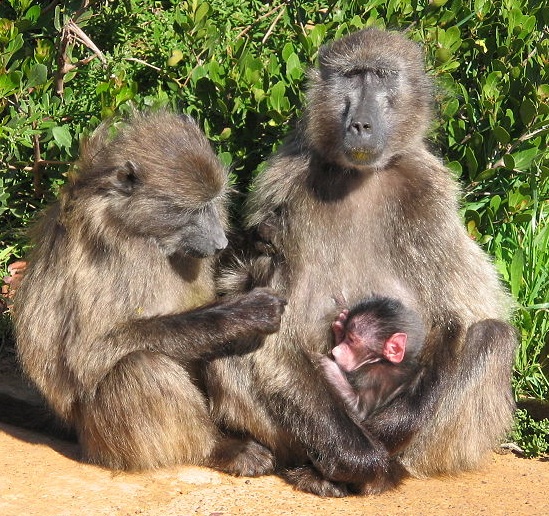Please note: Osher Rainforest will be closed for maintenance Jan. 14–16.
Science News
Baboon Girlfriends
July 6, 2010

Scientists are discovering that female friends are very important—and not just in the human world, but in the animal world as well.
Last month, researchers published a study on how female humpback whales reunite summer after summer in the same spot. Last week, a study about female baboon friendships was published in Current Biology.
This newer study finds that female baboons with deeper, longer female friendships actually live longer. According to an article in ScienceNow:
From 2001 to 2007, the researchers closely watched 44 female baboons, recording how often they approached each other, how long they groomed each other, and other measures of social interaction. (The researchers looked at females because, in many species, only females form these kinds of social bonds, whereas males are off doing other things and are competitive with each other rather than cooperative.) From these data, the researchers determined each baboon's top three partners in any given year. Thus the team could estimate the strength of each baboon's relationships with its closest partners over the years and the extent to which each baboon stuck to her best buddies.
The stability of baboon relationships seems to be a large factor—females who were able to maintain the same grooming partners from one year to the next lived longer and had more surviving offspring.
The results were a bit surprising because they had nothing to do with female hierarchy. “Given that high-ranking females have priority of access to food resources, one might have predicted that rank would be the primary factor influencing longevity,” said Dorothy Cheney, PhD, of the University of Pennsylvania and one of the authors of the study. “Our results indicate instead that the quality of a female's social bonds with other females is more important, suggesting that subordinate females may be able to offset the competitive disadvantage of low rank through their social relationships.”
The findings in baboons may also lend humans some insight into our own social lives, according to the researchers.
“Having friends is important for us and for female baboons—and maybe for some of the same reasons,” said lead author Joan Silk, PhD, of UCLA. “Our findings are strikingly similar to evidence from humans showing that social ties have important effects on our mental and physical health and our longevity. We suspect that the human motivation to form close and lasting friendships has a very long evolutionary history.”
Creative Commons image by Harald Süpfle